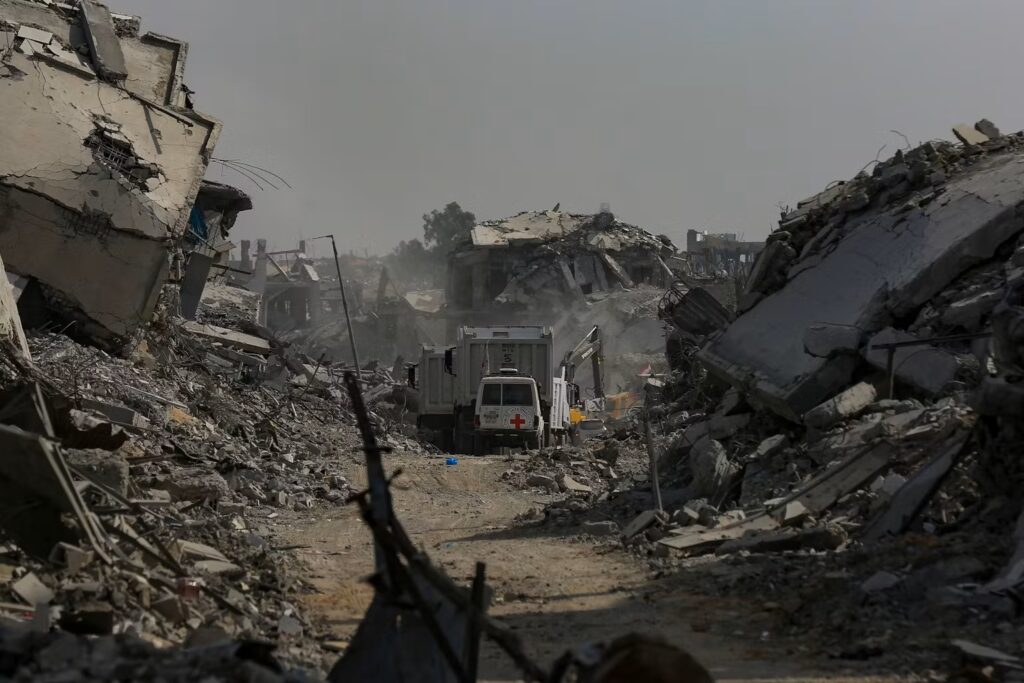How Wars Ravage The Environment And What International Law Is Doing About It
Nov 13, 2025 | Pratirodh Bureau
Following two years of war, Gazans are living among millions of tonnes of rubble (Mohammed Saber / EPA)
People across the Gaza Strip have been returning to towns and cities badly damaged by the war after a fragile ceasefire took effect in October. Eventually, their lives will be restored and their homes will be built back. But the climate consequences of the war will remain for years to come.
Research, which is currently under review, demonstrates that the equivalent of over 32 million tonnes of CO₂ was generated in the first 15 months of the war. This is equal to the greenhouse gas emissions of roughly eight-and-a-half coal-fired power plants in one year or the annual greenhouse gases emitted by Jordan.
The war in Ukraine has had a devastating environmental impact, too. One study, published in February 2025, concluded that the equivalent of nearly 237 million tonnes of CO₂ were released as a result of the war in the three years after Russia’s full-scale invasion. This figure is similar to the annual emissions of Austria, Czech Republic, Hungary and Slovakia combined.
It is currently up to researchers themselves to calculate the climate impact of wars. This is because there is no legal obligation for countries to report annual conflict emissions to the UN’s climate body, the UN Framework Convention on Climate Change (UNFCCC). But that may soon change.
In July, the International Court of Justice (ICJ) delivered a historic advisory opinion on countries’ obligations to tackle climate change. This much-anticipated opinion confirmed that states are legally bound to protect the climate system, and must take concrete action to tackle and respond to the climate emergency.
Two of the court’s key legal findings were that states are obliged to do their utmost to prevent harm to the climate system and to cooperate with each other to that end. In a declaration annexed to the opinion, Judge Sarah Cleveland emphasised that this obligation necessarily includes assessing, reporting on and tackling greenhouse gas emissions from armed conflicts.
As she explained: “Failing to take such harms into account underreports and distorts our understanding of global warming and undermines the ability of the international community to tackle its causes. It is thus directly contrary to the international obligations of states to protect the climate system and other parts of the environment from greenhouse gas emissions.”
Protecting the environment
The ICJ’s opinion followed a number of international legal efforts in recent years to protect the environment from harm caused by conflict. In 2022, the UN’s authoritative International Law Commission released its “draft principles” on the protection of the environment during armed conflict. The principles were approved by the UN general assembly in December of that year.

They set out how the environment should be protected before, during and after armed conflicts, while also presenting a framework for environmental protection in situations of occupation. The principles include recognition of the potential of armed conflict to exacerbate global environmental challenges, such as climate change and biodiversity loss.
Ecocide is also emerging as an important way to think about war and its associated ecological destruction. This is defined as severe and either widespread or long-term harm to the environment that results from unlawful or wanton acts.
Several states, including Belgium and Chile, have already adopted the crime in their national laws. And the International Union for Conservation of Nature, the world’s largest and most diverse environmental network, voted to adopt a motion in October “recognising the crime of ecocide to protect nature”.
The ecological devastation that has been inflicted in Gaza probably reaches the level of ecocide. Even before the conflict began, the populations of Gaza and neighbouring communities in Israel were experiencing long periods of water scarcity and extreme heat. But the widespread devastation caused by two years of war means Gazans now face devastating environmental and health conditions.
Food production is now impossible as munitions, solid waste and untreated sewage contaminate Gaza’s farmland. The UN Environment Programme estimates that up to 97% of tree crops, 82% of annual crops and 89% of pastureland there have been destroyed during the war.
One study, published in July 2025, also found that it could take as long as four decades to remove the millions of tonnes of rubble left by the Israeli military’s bombardment. The researchers estimated that removing and processing the rubble from Gaza alone will involve driving heavy machinery and trucks a total of 18 million miles – approximately 737 times around the world. This will generate the equivalent of almost 66,000 tonnes of CO₂.
International law is beginning to reflect the growing consensus among states and global bodies on the need to recognise the climate and wider environmental effects of armed conflicts. But the scale of the environmental damage inflicted by conflict underlines the urgent need for transparent reporting and robust data. Global climate policy is proceeding without the full facts.
(Published under Creative Commons from The Conversation)
